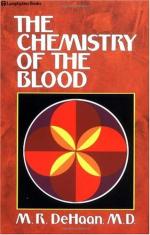|
This section contains 1,030 words (approx. 4 pages at 300 words per page) |

|
Blood in the human body is a complex fluid. It is responsible for transport of dissolved gases, nutrients and waste products. It regulates the pH of not only itself, but of all the intercellular fluid in the body. In addition, blood carries hormones and critical parts of the immune system throughout the body, and aids in thermoregulation by redistributing heat. Blood also contains the factors needed for clotting, thereby preventing its own loss in the event of injury.
An adult human has 4-6 liters of blood. Approximately half of this is water, and slightly less than half is red blood cells. The rest is made up of proteins, sugars, salts, and other small molecules, plus white blood cells and platelets. The noncellular portion is termed plasma, while the cellular parts are collectively referred to as the formed elements.
While a small amount of oxygen can be...
|
This section contains 1,030 words (approx. 4 pages at 300 words per page) |

|


